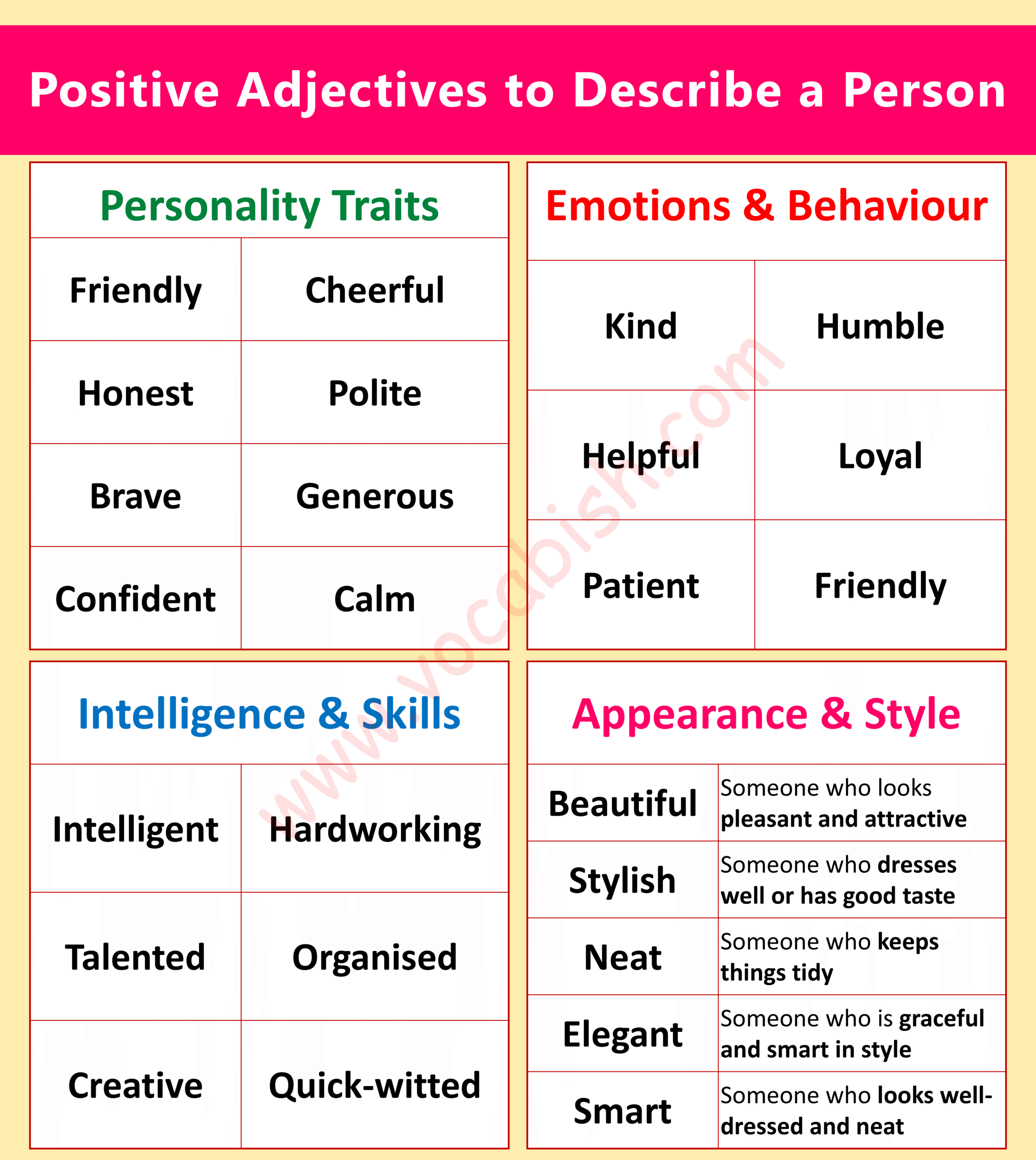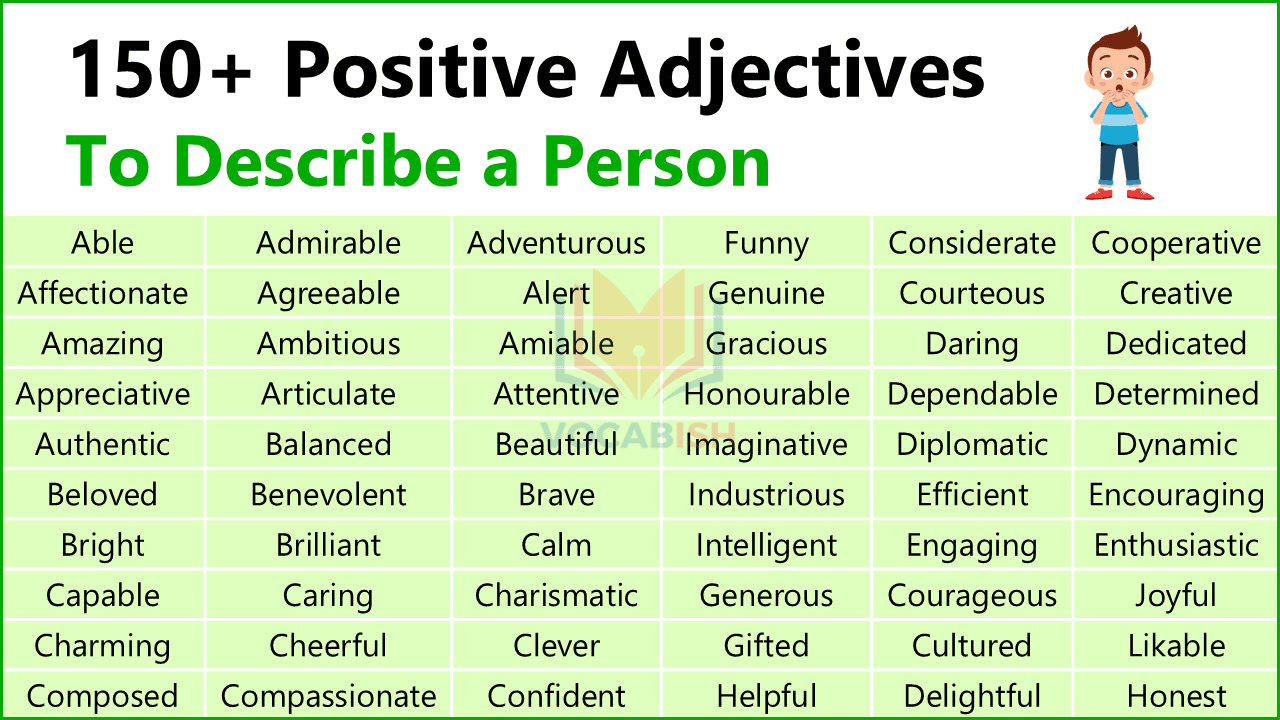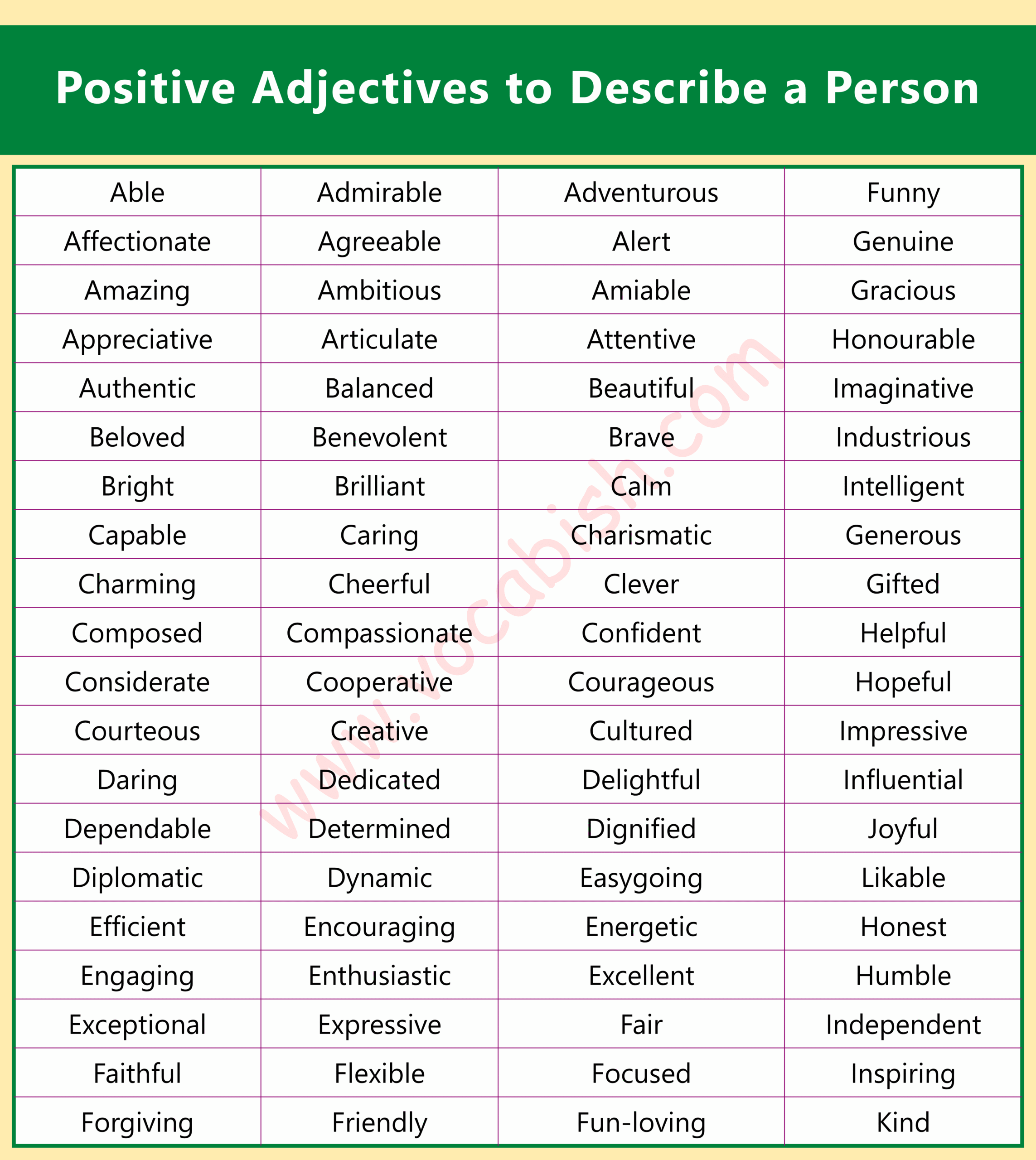In this blog post, you will learn 150+ positive adjectives to describe a person in English. These words help you understand how to express people’s qualities, character, and personality clearly. A strong vocabulary of personality adjectives improves speaking, reading, writing, and listening skills. When you know the right words, you can describe yourself and others confidently and accurately. Our aim is to help you master useful positive adjectives step by step. Keep reading and enhance your English communication today.
What Are Positive Adjectives?
Positive adjectives are words used to describe people in a good or favourable way. They can describe:
- Personality: smart, friendly, brave
- Appearance: beautiful, neat, stylish
- Skills or abilities: talented, creative, organised
- Behaviour: kind, honest, helpful
Example:
- She is friendly and helpful.
- He is intelligent and talented.
These words are used in everyday conversations, writing, job interviews, and school assignments.
Why Use Positive Adjectives?
Using positive adjectives is important because they help to:
- Show respect and kindness
- Describe people clearly
- Make writing interesting and polite
- Improve communication skills
For example, saying “She is helpful and kind” sounds much better than just “She helps people”.
Different Kinds of Positive Adjectives to Describe a Person
Here is a list of positive adjectives grouped for easier learning:
Personality Traits
| Adjective | Meaning |
|---|---|
| Friendly | Someone who is kind and easy to talk to |
| Honest | Someone who tells the truth |
| Brave | Someone who faces fear without worry |
| Confident | Someone who trusts themselves |
| Calm | Someone who is relaxed and patient |
| Cheerful | Someone who is happy and positive |
| Polite | Someone who behaves with respect |
| Generous | Someone who shares and gives freely |
Appearance and Style
| Adjective | Meaning |
|---|---|
| Beautiful | Someone who looks pleasant and attractive |
| Stylish | Someone who dresses well or has good taste |
| Neat | Someone who keeps things tidy |
| Elegant | Someone who is graceful and smart in style |
| Smart | Someone who looks well-dressed and neat |
Intelligence and Skills
| Adjective | Meaning |
|---|---|
| Intelligent | Someone who learns and understands quickly |
| Talented | Someone who has special skills or ability |
| Creative | Someone who thinks in new ways |
| Hardworking | Someone who puts effort into work |
| Organised | Someone who plans things carefully |
| Quick-witted | Someone who thinks and reacts fast |
Emotions and Behaviour
| Adjective | Meaning |
|---|---|
| Kind | Someone who cares for others |
| Helpful | Someone who assists people willingly |
| Patient | Someone who waits calmly |
| Humble | Someone who is modest, not proud |
| Loyal | Someone who stays faithful to friends or family |
| Friendly | Someone who treats others warmly |

How to Use Positive Adjectives in Sentences
Using positive adjectives is simple. You can place them before nouns or after verbs like ‘be’.
Examples:
- She is friendly and helpful.
- He has a creative mind.
- They are hardworking and reliable.
Tip: Always match adjectives to the person’s qualities to make your sentence natural.
List of Positive Adjectives to Describe a Person
| Able | Admirable | Adventurous |
| Affectionate | Agreeable | Alert |
| Amazing | Ambitious | Amiable |
| Appreciative | Articulate | Attentive |
| Authentic | Balanced | Beautiful |
| Beloved | Benevolent | Brave |
| Bright | Brilliant | Calm |
| Capable | Caring | Charismatic |
| Charming | Cheerful | Clever |
| Composed | Compassionate | Confident |
| Considerate | Cooperative | Courageous |
| Courteous | Creative | Cultured |
| Daring | Dedicated | Delightful |
| Dependable | Determined | Dignified |
| Diplomatic | Dynamic | Easygoing |
| Efficient | Encouraging | Energetic |
| Engaging | Enthusiastic | Excellent |
| Exceptional | Expressive | Fair |
| Faithful | Flexible | Focused |
| Forgiving | Friendly | Fun-loving |
| Funny | Generous | Gentle |
| Genuine | Gifted | Good-natured |
| Gracious | Helpful | Honest |
| Honourable | Hopeful | Humble |
| Imaginative | Impressive | Independent |
| Industrious | Influential | Inspiring |
| Intelligent | Joyful | Kind |
| Knowledgeable | Likable | Loving |
| Loyal | Mature | Mindful |
| Modest | Motivated | Neat |
| Noble | Observant | Open-minded |
| Optimistic | Organised | Outstanding |
| Passionate | Patient | Peaceful |
| Perceptive | Perfect | Pleasant |
| Polite | Positive | Practical |
| Precious | Proactive | Productive |
| Protective | Quick-witted | Radiant |
| Rational | Realistic | Reasonable |
| Reliable | Remarkable | Respectful |
| Responsible | Result-oriented | Romantic |
| Sincere | Skilful | Smart |
| Sociable | Soft-hearted | Spirited |
| Strong | Supportive | Sweet |
| Talented | Thoughtful | Tolerant |
| Trusting | Trustworthy | Truthful |
| Understanding | Unique | Upbeat |
| Versatile | Vibrant | Warm |
| Warm-hearted | Welcoming | Wise |
| Witty | Wonderful | Youthful |
| Zealous | Patient-hearted | Steady |
Learning positive adjectives helps you describe people clearly and politely. Use these words in writing, speaking, and everyday conversation to sound confident and kind. Remember, practising these words regularly will improve your English fast.
FAQs
What are positive adjectives to describe a person?
Positive adjectives are words that show good qualities in a person, such as kind, honest, or creative. They help you describe someone’s character, behaviour, or skills in a clear and polite way.
Why should I use positive adjectives in writing?
Positive adjectives make your writing clearer, more respectful, and more engaging. They help you express someone’s strengths and create a friendly and meaningful description.
What are common positive adjectives to describe someone?
Common positive adjectives include friendly, helpful, smart, loyal, brave, polite, and generous. These words are easy to use in daily conversation and writing.
How can I choose the right adjective for a person?
Choose adjectives that match the person’s real qualities. Think about their behaviour, actions, or personality, and select words that describe them accurately.
Are positive adjectives used in job interviews?
Yes. Positive adjectives like responsible, organised, hardworking, and reliable are often used in interviews to explain someone’s strengths and work habits.
Read More


